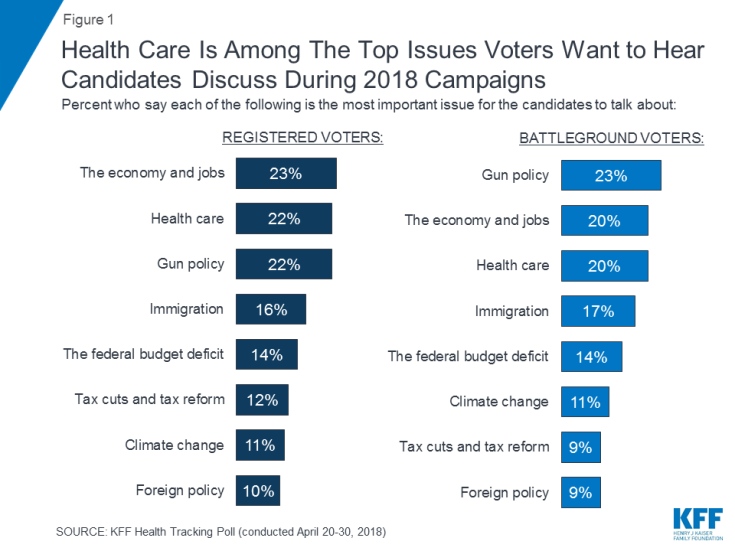
Figure 1: Health Care Is Among The Top Issues Voters Want to Hear Candidates Discuss During 2018 Campaigns
Published: May 10, 2018
The Henry J. Kaiser Family Foundation
This month marks the big push in the Democratic and Republican primary season and with congressional campaigns gearing up, the latest Kaiser Health Tracking Poll examines the top issues that voters want to hear the candidates talk about on the campaign trail. Overall, the top issues chosen by voters are the economy and jobs (23 percent), health care (22 percent), and gun policy (22 percent) – an issue back in the news following recent school shootings and subsequent protests. Health care also ranks among the top issues that voters who live in areas where there are competitive House, Senate, or Governor races want to hear candidates discuss (20 percent), along with gun policy (23 percent), economy and jobs (20 percent), and immigration (17 percent).

Figure 1: Health Care Is Among The Top Issues Voters Want to Hear Candidates Discuss During 2018 Campaigns
2018 Midterm Election Analysis
As part of Kaiser Family Foundationfs effort to examine the role of health care in the 2018 midterm elections, throughout the year we will be tracking the views of voters – paying special attention to those living in states or congressional districts in which both parties have a viable path to win the election. This group, referred to in our analysis as gvoters in battlegroundsh is defined by the 2018 Senate, House, and Governor ratings provided by The Cook Political Report. Congressional and Governor races categorized as gtoss-uph were included in this group. A complete list of the states and congressional districts included in the comparison group is available in Appendix A.
The ranking of these issues varies across party lines with fewer Republican voters (15 percent) saying health care is the gmost important issueh for candidates for Congress to talk about. Larger shares of Republican voters say the economy and jobs (24 percent), immigration (22 percent), and gun policy (19 percent) are the most important issue for candidates to discuss. Health care ranks among a series of second tier issues for Republican voters including other issues such as the federal budget deficit (14 percent), and tax cuts and tax reform (14 percent). This may mark a turning point for the prominence of health care in Republican campaigns compared to the past four election cycles – since the passage of the 2010 health care law – health care has been a major talking point for Republican candidates.1
Health care ranks higher among issues for both Democratic voters and independent voters. Three in ten Democratic voters say health care is the gmost important issueh for candidates to talk about, which is similar to the share who say the same about gun policy (28 percent). The top issues for independent voters are the economy and jobs (22 percent), gun policy (19 percent), and health care (19 percent).
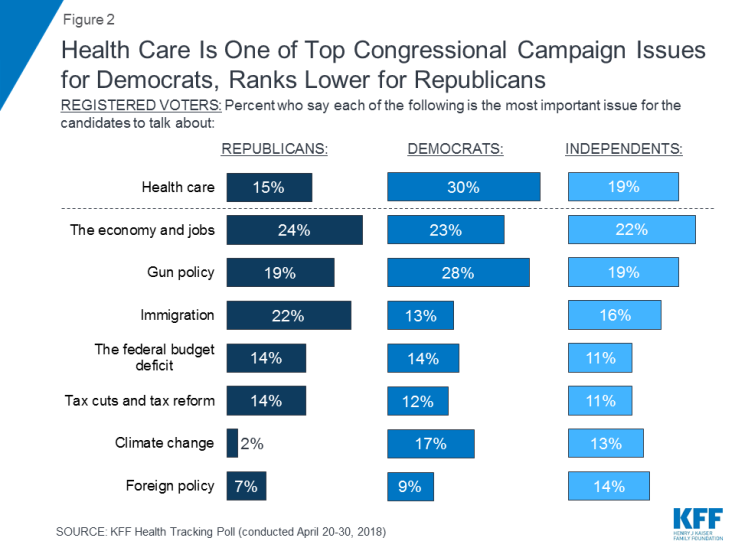
Figure 2: Health Care Is One of Top Congressional Campaign Issues for Democrats, Ranks Lower for Republicans
When forced to choose the most important issue they want to hear the congressional candidates discuss among all issues polled, gun policy (14 percent), the economy and jobs (13 percent) and health care (12 percent) are the top issues for voters overall. However, nearly four in ten voters (36 percent) say none of the issues on this list are the gmost importanth for the candidates to discuss.
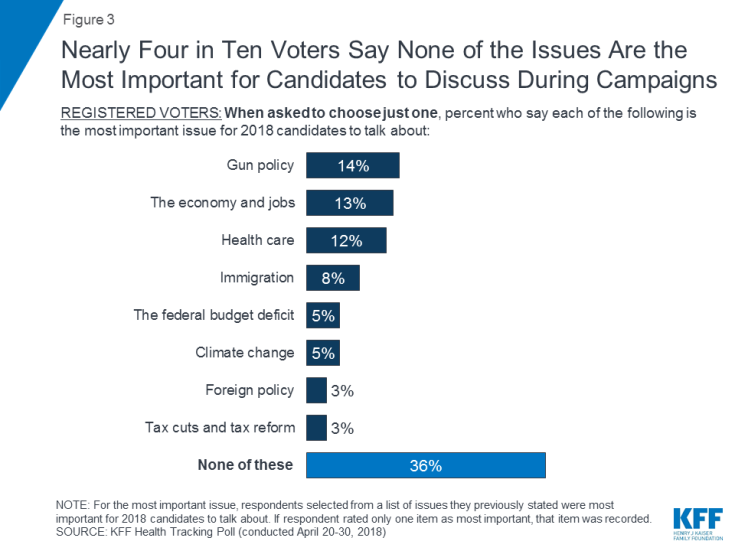
Figure 3: Nearly Four in Ten Voters Say None of the Issues Are the Most Important for Candidates to Discuss During Campaigns
One reason why nearly four in ten (36 percent) say none of the issues provided are the gmost importanth for congressional candidates to discuss may be because voters seem to care more about the candidatesf character and experience or their support for or opposition to President Trump. When national issues are put up against these other voting factors, majorities of Republican and Democratic voters say ga candidatefs support or opposition to President Trumph or the gcandidatefs character and experienceh will make the biggest difference in how they vote for Congress.
Nearly one-third of Republican voters (32 percent) and three in ten Democratic voters say a candidatefs support for or opposition to President Trump will make the biggest difference in their congressional vote choice. Smaller shares – about one five – say either gspecific national issuesh or glocal or state issuesh will make the biggest difference. Independent voters are less likely than partisan voters to say a candidatefs support for or opposition to President Trump will make the biggest difference (17 percent).
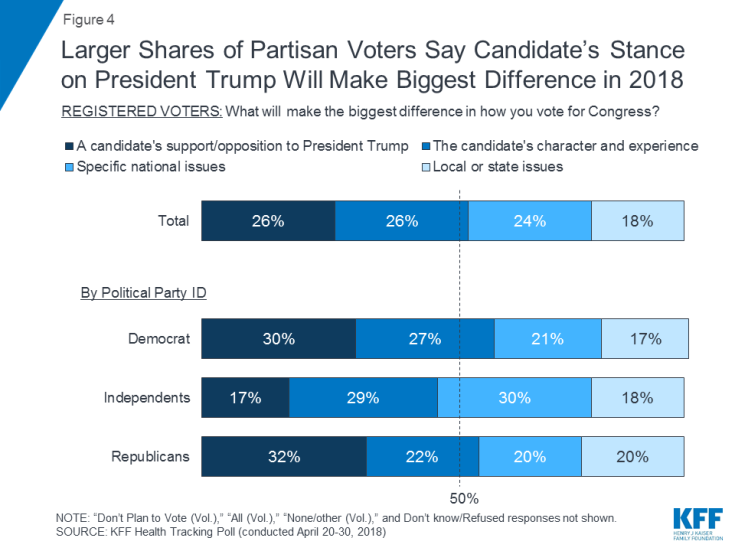
Figure 4: Larger Shares of Partisan Voters Say Candidatefs Stance on President Trump Will Make Biggest Difference in 2018
Even among voters who say health care is the most important issue for 2018 congressional candidates to talk about, three in ten (28 percent) say a candidatefs support for or opposition to President Trump will make the biggest difference in their vote for Congress and another one in five say it will be the candidatefs character and experience.
Nearly four times as many Republican voters living in battleground areas say a gcandidatefs support for or opposition to President Trumph will make the biggest difference in how they vote for Congress (37 percent) than say health care is a top issue for congressional candidates to discuss (10 percent). A large share of this yearfs competitive elections are taking place in traditionally strong Republican areas, where voters may be more conservative than Republicans overall.
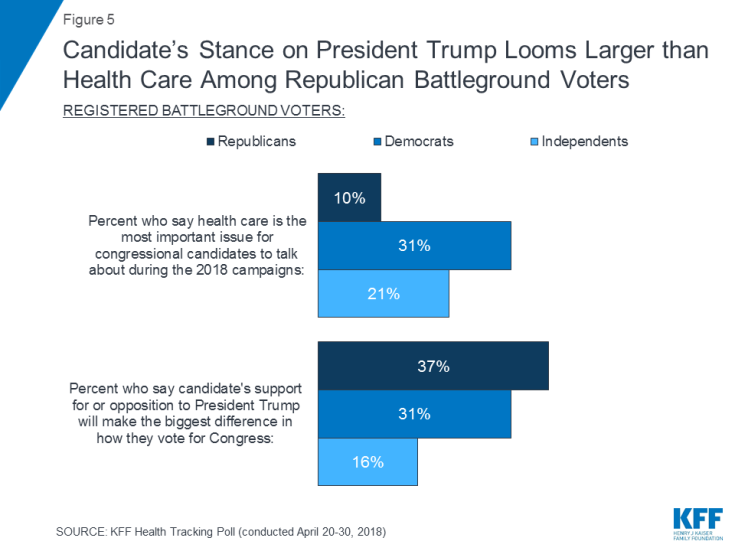
Figure 5: Candidatefs Stance on President Trump Looms Larger than Health Care Among Republican Battleground Voters
As other polls have shown, Democrats have a clear edge when it comes to voter enthusiasm six months out from the midterm elections. While a majority of all voters say their enthusiasm about voting this year is gabout the sameh as in previous congressional elections, 45 percent of Democratic voters say they are gmore enthusiastich this year than in the past, compared to three in ten Republicans and independents (31 percent).
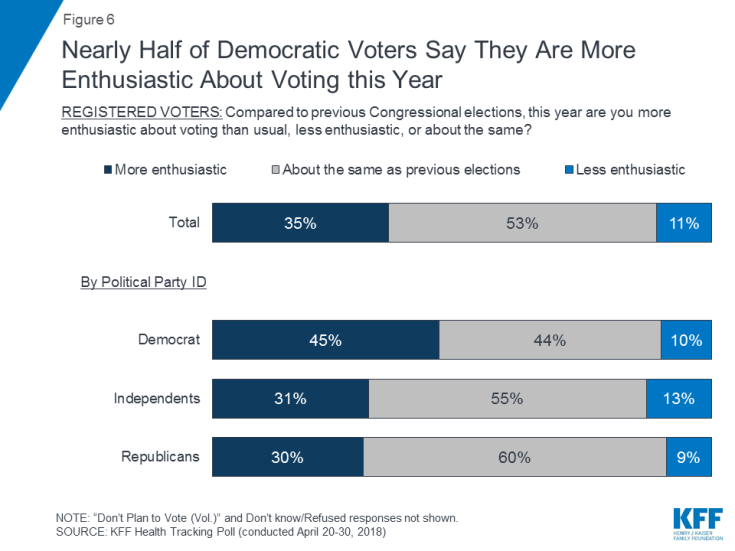
Figure 6: Nearly Half of Democratic Voters Say They Are More Enthusiastic About Voting this Year
The current enthusiasm gap is flipped from KFFfs 2014 midterm polling, in which a slightly larger share of Republicans said they were gmore enthusiastich (27 percent) compared to one in five Democrats and independents (18 percent). Yet, similar to 2014, no issue – including health care – seems to be a driving force among enthusiastic voters – across both Democrats and Republicans.
When asked to say in their own words why they are more enthusiastic about voting this year, the most commonly offered response from Democrats was ga desire for changeh (22 percent) while one in five Republicans said they are more enthusiastic because they want to vote gto support President Trump and the current administration.h About six percent of voters who are more enthusiastic this year explicitly mention concern over a specific issue (few explicitly mention health care) as the main reason for their enthusiasm.
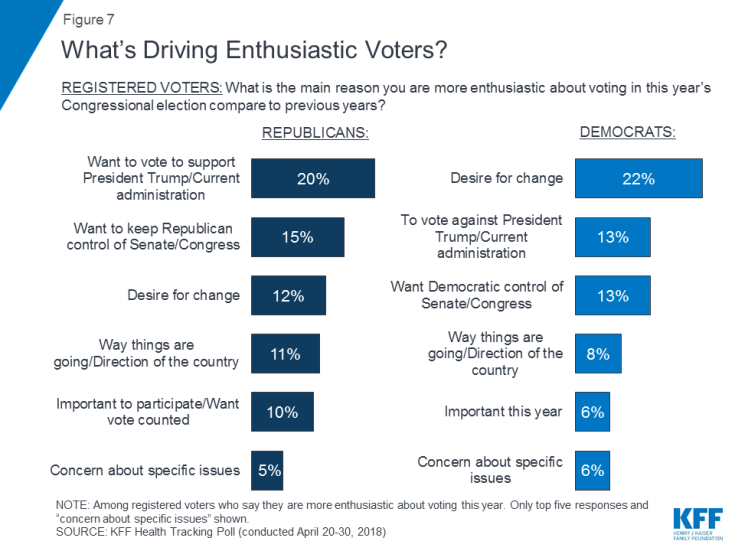
Figure 7: Whatfs Driving Enthusiastic Voters?
Over the next six months, the Kaiser Family Foundation will be tracking a unique group of voters – health care voters. When asked whether a series of issues will be an important factor in their 2018 congressional vote choice, these voters say a candidatefs position on health care will be the gmost important factorh in their decision. Overall, one-fourth of voters (23 percent) are ghealth care voters,h which includes five percent who are single-issue health care voters (meaning they only chose health care as the most important factor). To compare the demographic profile of health care voters to other voters, see our health care voter interactive.
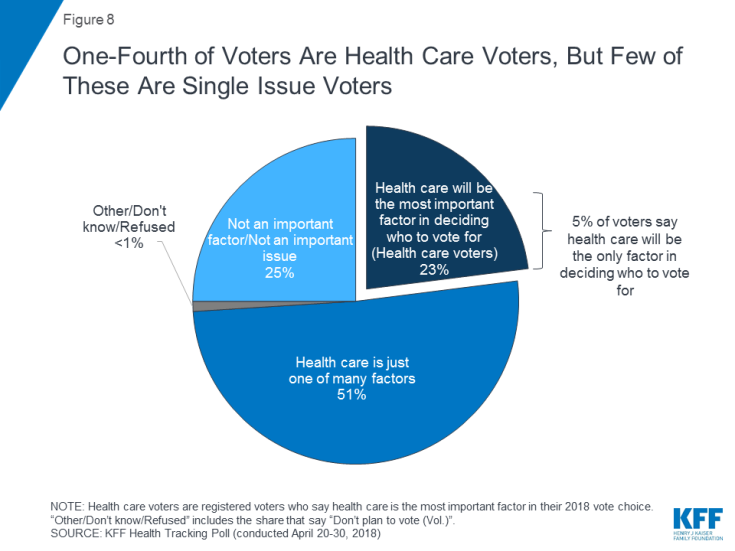
Figure 8: One-Fourth of Voters Are Health Care Voters, But Few of These Are Single Issue Voters
Six in ten health care voters are Democrats (47 percent) or Democratic-leaning independents (15 percent), while seven percent describe themselves as independents and one-fourth are Republicans (15 percent) or Republican-leaning independents (8 percent).
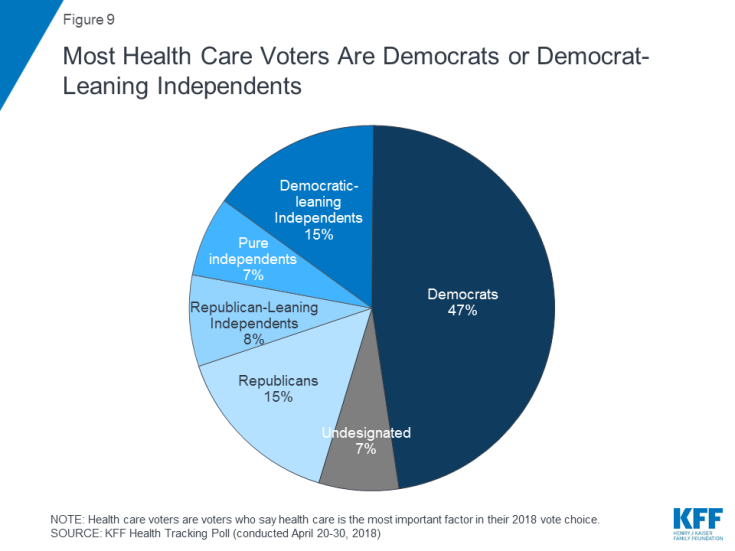
Figure 9: Most Health Care Voters Are Democrats or Democrat-Leaning Independents
A more liberal-leaning, Democratic group of voters, seven in ten disapprove of the way Donald Trump is handling his job as President, and six in ten (59 percent) say that if the November election was held today, they would vote for the Democratic candidate in their district. Yet, this group is not more enthusiastic about voting in the 2018 midterm election with four in ten (38 percent) saying they are gmore enthusiastich compared to 34 percent of voters who are not health care voters.
| Table 1: Health Care Voters Lean Democratic on All Measures | ||
| Health Care Voters | Not Health Care Voters | |
| Percent who disapprove of the way Donald Trump is handling his job as President: | 70 | 49 |
| Percent who say this November, they are more likely to support the Democratic Partyfs candidate in their district: | 59 | 42 |
| Percent who are more enthusiastic about voting this year compared to previous congressional elections: | 38 | 34 |
Poll: Votersf biggest health care concern is their personal costs – not the #ACA or #singlepayer
When asked to say in their own words what specific health care issues they most want to hear the 2018 candidates discuss, health care costs are the top issue mentioned by both Democratic-leaning health care voters (31 percent) and Republican-leaning health care voters (55 percent). The other health care issues vary in importance by partisanship. About one in five (18 percent) of Democratic health care voters say they want to hear candidates discuss universal coverage and about one in ten (11 percent) mention concerns about quality of coverage or care. About one in ten Republican-leaning health care voters want to hear candidates talk about Medicare/senior concerns (9 percent) and improvements in the way health care is delivered (8 percent). Health care costs are also the top health care issue that all voters want to hear candidates talk about during the 2018 campaign.
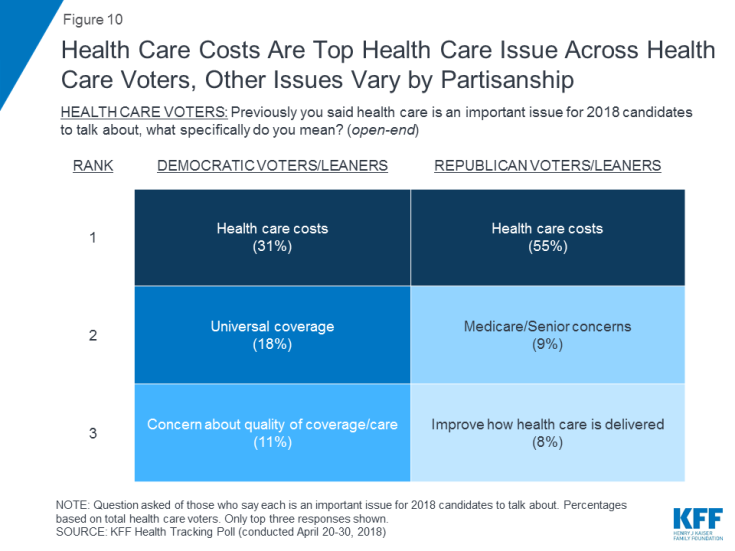
Figure 10: Health Care Costs Are Top Health Care Issue Across Health Care Voters, Other Issues Vary by Partisanship
While health care is not the driving issue for most voters, a candidatefs position on specific health care issues may influence votersf decisions this fall – especially when it comes to health care costs. Two-thirds of Republican voters, nearly eight in ten Democratic voters (78 percent), and 72 percent of independent voters say that if a candidate for Congress supports bringing down prescription drug costs, they would be gmore likelyh to vote for that candidate. The same is true of a candidate who wants to lower health care or health insurance costs, with six in ten Republican voters (63 percent), three-fourths of Democratic voters, and 68 percent of independent voters saying they would be more likely to vote for that candidate. Few partisans – regardless of party identification – say they would be gmore likelyh to vote for a candidate who wants to reduce government spending on health programs such as Medicare and Medicaid.
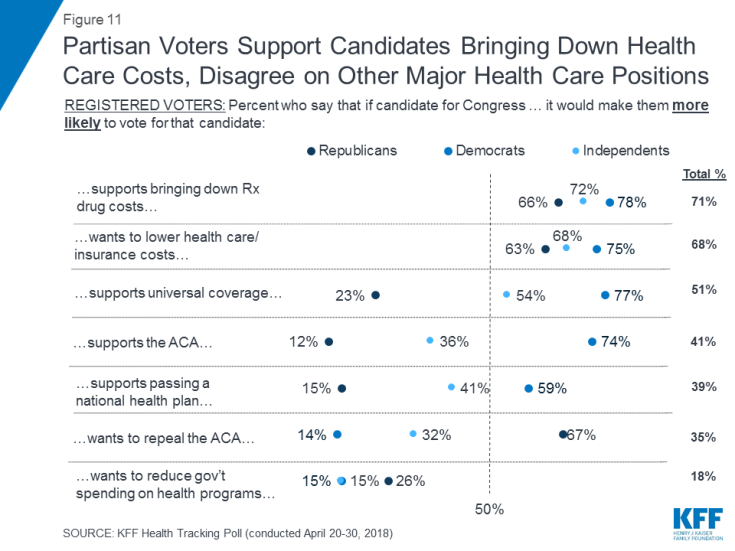
Figure 11: Partisan Voters Support Candidates Bringing Down Health Care Costs, Disagree on Other Major Health Care Positions
That is seemingly, where the partisan agreement ends, with majorities of Democratic voters saying they would be more likely to vote for a candidate who supports universal coverage (77 percent), supports the Affordable Care Act (74 percent), or supports passing a national health plan (59 percent). On the other hand, a majority of Republican voters say they would be more likely to support a candidate who wants to repeal the Affordable Care Act (67 percent).
Partisanship still drives views of the 2010 Affordable Care Act (ACA). About half (49 percent) of the public and vast majorities of Democrats (79 percent) hold a favorable view of the ACA, while 43 percent of the public and majorities of Republicans (79 percent) hold an unfavorable view of the law. This is similar to last monthfs tracking poll and continues the nearly year-long trend of a larger share of the public holding favorable than unfavorable views.
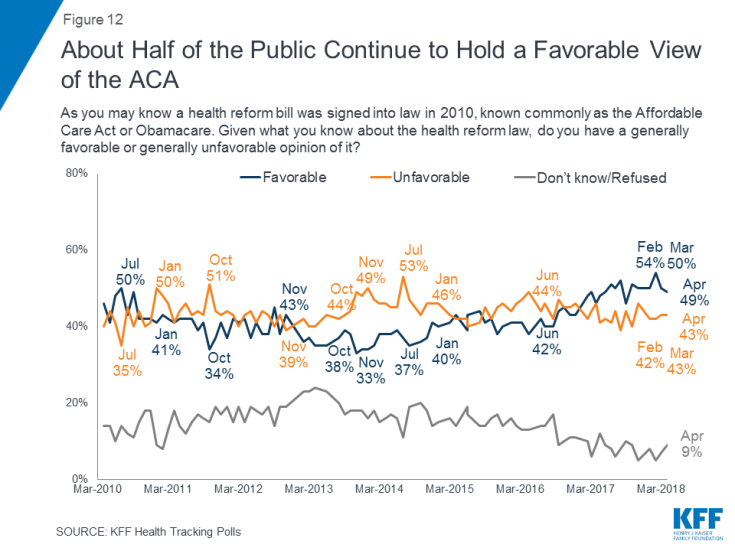
Figure 12: About Half of the Public Continue to Hold a Favorable View of the ACA